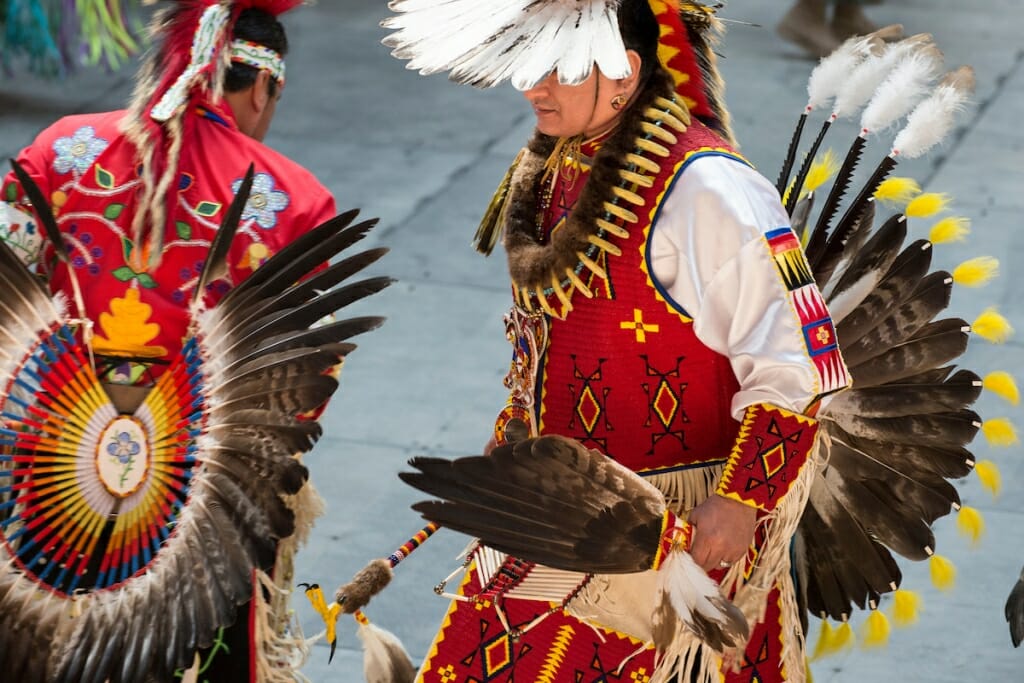Student-led On Wisconsin Powwow brings ‘the spirit of home straight to campus’

While there are a wide range of activities during the event, the main focus is dancing, drums and giving indigenous students a space to collectively celebrate their culture. Photo: Jeff Miller
On April 6 and 7 Wunk Sheek and the University of Wisconsin–Madison will present the Annual On Wisconsin Spring Powwow at the Alliant Energy Center Arena in Madison. Festivities begin at 10 a.m. with the Grand Entries taking place at 1 p.m. each day. Everyone is welcome to attend this free event that will feature cultural education, dancing, food, crafts, and drums from Ho-Chunk Station, Wild Eagle (Oneida), Tomahawk Circle (Lac du Flambeau) and Fire Nation (Potawatomi).
The student organization Wunk Sheek has managed the annual powwow in some capacity since its inception around a half century ago. Led by four co-presidents, Wunk Sheek (Waaksik), a Ho-Chunk word for human being, offers students of indigenous identity an opportunity to socialize and share indigenous knowledge, education and experiences, while connecting with fellow UW–Madison students who are interested in indigenous issues, culture and history. The powwow is a part of that educational outreach as well as an opportunity for students of indigenous identity to celebrate their culture.
“This is an event for all tribal nations,” says Wunk Sheek co-president Michael Williams. “We’ve had Aztec dancers as well as dancers and drummers from all tribes in Wisconsin.”
Several tribal community leaders from Wisconsin will participate in the weekend’s festivities, including the two emcees, Artley Skenandore (Oneida) and Gerry Cleveland (Ho-Chunk), who will work together with the arena director Dylan Jennings (Bad River) to announce the various entries. Each Grand Entry procession will open with two lead color guards, Ho-Chunk Post 556 and Stockbridge, as well as a head veteran Paul Cloud (Ho-Chunk). There will also be a head male dancer, Ken Funmaker (Ho-Chunk), and head female dancer, Jamie Awonohopay (Menominee).
“We have music, food, vendors and an arena where it’s all happening,” says Williams. “You can walk around, explore, view dancing or visit the educational corner, which has coloring books for kids and educational activities.”
While there are a wide range of activities during the event, Williams says the main focus is dancing, drums and giving indigenous students a space to collectively celebrate their culture.
“The powwow has always been about helping students to identify with Native culture, says Janice Rice, a senior academic librarian emerita, who served as the treasurer of Wunk Sheek from 1974–75. “It’s always been for the students. They live with mainstream society during the school year, so this is a chance for them to bring the spirit of home straight to campus. They can enjoy the songs, dances and cultural connections and be rejuvenated. It’s also a great opportunity for their families and younger people to come to campus and see their siblings and other relatives enjoying college life and be inspired to go to college.”
The powwow also provides the broader campus community with an important cultural experience, says Aaron Bird Bear, the assistant dean of student diversity programs in the School of Education, offering an opportunity to learn outside of the classroom and gain a deeper knowledge and understanding of their peers’ culture.
“Today, there are approximately 1,000 self-identified American Indian/Alaskan Native/Native Hawaiian alumni of UW–Madison,” said Bird Bear. “Wunk Sheek serves as a place where Native American students can learn about each other’s cultures. With the 12 First Nations of Wisconsin speaking six different languages, it is much like an international learning community, but there are many other students from Native Nations not of Wisconsin. Indeed, in 2016, there were 41 different Native American Nations represented in the UW–Madison student body, representing over 28 different indigenous languages.”
UW–Madison is proud to co-host this event for the sixth consecutive year and continue its work to support students of indigenous identity through events and programs such as the Native Nations_UW Working Group.
“The powwow is a beautiful cultural celebration as well as an opportunity for students and the public to learn more about the culture that has been on this land for a very long time,” says Assistant Dean of Students and Director of the Multicultural Student Center Gabe Javier. “There are a number of departments and divisions that financially, or otherwise, support the powwow and it’s a tremendous thing for the university to be a part of.”
Free buses from the Chazen Museum of Art and Dejope Residence Hall will be available every 30 minutes from 10 a.m. to 9 p.m. Saturday to transport students to the event.
Tags: diversity, events, Native Nations, student life



